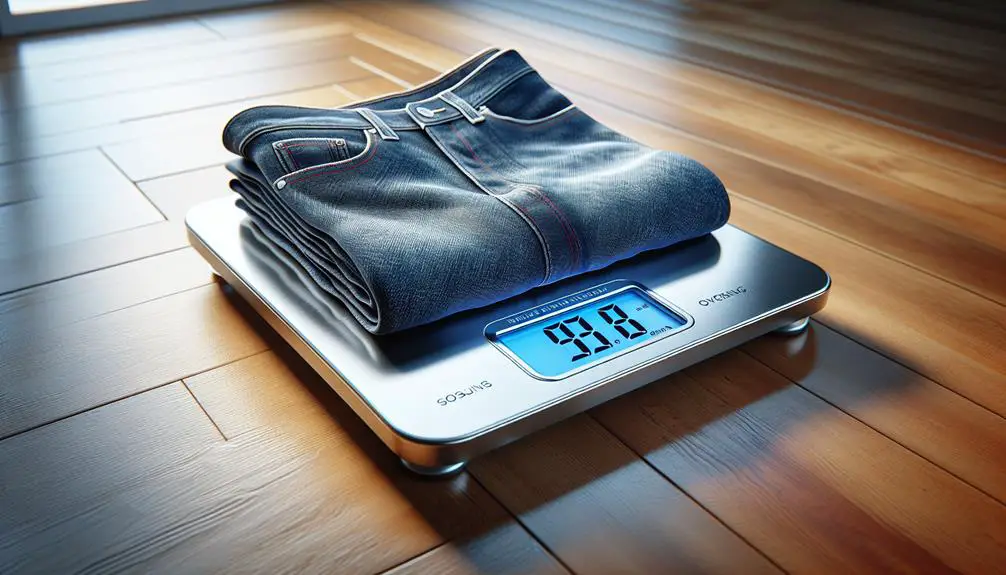Pants, a staple in most wardrobes, typically weigh between 70 to 100 grams for men. Women's pants may have a slight variance in weight due to material and style differences.
But have you ever wondered why the weight of pants matters?
Well, let's uncover the factors influencing pant weight— from fabric selection to design choices— to understand how these elements play a part in determining the weight of our everyday attire.
Table of Contents
Key Takeaways
- Cargo pants are heavier due to extra pockets, weighing more than jeans or dress pants.
- Fabric choice impacts weight; polyester pants are lighter than cotton, aiding in comfort.
- Pant style influences weight; leggings and skinny jeans are lighter compared to cargo pants.
- Material selection like nylon or polyester can significantly reduce pant weight for comfort and practicality.
Factors Impacting Pants Weight
When it comes to understanding the weight of pants, various factors play a significant role in determining their overall heaviness. Weighing clothes can be quite enlightening, as it reveals that different types of pants have distinct weights.
Cargo pants, known for their extra pockets, tend to be heavier due to the additional material used in their construction. Denim jeans, a classic choice for many, can weigh between 1.3 to 2.5 pounds, while dress pants usually range around 0.8 to 0.9 pounds.
To get an accurate measurement of your body weight, the best thing to do is to make sure to subtract the weight of your pants, along with other clothing items, when weighing yourself. This simple adjustment can provide a more precise reflection of your actual weight. Understanding these nuances can help in selecting the right pants for different occasions based on comfort and practicality.
Common Fabric Choices for Pants
When choosing pants, the fabric plays a significant role in determining their weight. From the lightness of linen to the durability of denim and the elegance of wool, each fabric choice impacts the overall weight of the pants.
Understanding the characteristics of fabrics like cotton, polyester, denim, corduroy, wool, and linen can help in selecting pants that not only fit well but also feel comfortable for different occasions.
Cotton Vs. Polyester
In choosing between cotton and polyester for pants, the weight of the fabric plays a significant role in determining the overall comfort and feel of the garment. Cotton pants typically weigh around 1.3 to 2.5 pounds, while polyester pants are lighter, weighing about 0.8 to 1.5 pounds.
The variation in weight is due to the fabric composition, with cotton being heavier than polyester. This weight difference can be noticeable, especially if you're always on the move around us or in a doctor's office. Polyester is favored for its lighter feel and wrinkle-resistant properties, making it a practical choice for those seeking a more lightweight and easy-care option in their wardrobe.
Denim and Corduroy
Denim and corduroy, two common fabric choices for pants, offer distinct characteristics that cater to different style preferences and occasions. Denim pants typically weigh between 1.3 to 2.5 pounds, varying based on size and style, while corduroy pants can weigh slightly more, ranging from 1.5 to 2.8 pounds due to the thicker fabric.
Design elements like pockets, zippers, and embellishments also contribute to the overall weight of the pants. Keep in mind that lightweight pants made of materials like cotton or linen may weigh less than heavier fabrics such as wool or leather. Cargo pants, with extra pockets and features, might weigh more than regular trousers due to the additional material used in their construction.
Wool and Linen
Choosing between wool and linen for pants comes down to more than just style; it's also about finding the right balance between warmth and breathability. Wool pants weigh between 1.5 to 2 pounds, offering excellent insulation for colder seasons. On the other hand, linen pants are lighter, averaging 1 to 1.5 pounds, making them ideal for warmer weather due to their breathability. The weight of pants can vary based on fabric thickness and density, with cargo pants usually weighing slightly more due to added pockets. Stretchy pants with elastic fibers like spandex may weigh less than traditional materials. The table below summarizes the average weights of wool and linen pants:
| Fabric | Average Weight (lbs) |
|---|---|
| Wool | 1.5 – 2 |
| Linen | 1 – 1.5 |
The Influence of Pant Style
When it comes to the weight of pants, the style plays a significant role. Different styles like jeans, dress pants, and cargo pants vary in weight due to their unique design features.
Factors such as extra pockets, material choice, and embellishments all influence how heavy or light a pair of pants can be.
Pant Style Weight
Exploring different pant styles reveals a significant impact on the weight of the garment, influencing both comfort and mobility. Jeans, typically weighing between 1.3 to 2.5 pounds, offer a sturdy feel but can be heavier than dress pants, which weigh around 0.8 to 0.9 pounds.
Cargo pants, with their added pockets and features, may exceed the weight of standard dress or casual pants. In contrast, leggings and skinny jeans tend to be lighter in weight compared to bootcut or flared styles.
It's important to note that the material of the pants also plays a role; denim is heavier than cotton or spandex blends. Understanding these weight variations in pant styles can help you choose the most suitable option for your needs.
Fabric Impact
As we consider the influence of pant style on weight, one significant factor to examine is the impact of fabric choice. When it comes to the weight of pants, the type of fabric used plays a crucial role. Here are some key points to keep in mind:
- Denim jeans typically weigh more than lightweight cotton or linen pants.
- Cargo pants with extra pockets and embellishments may weigh more than slim-fit dress pants due to additional fabric and hardware.
- Corduroy pants tend to be heavier than chinos or khakis due to the thicker ribbed texture of the fabric.
- Flared or bootcut pants may weigh more than straight-leg or skinny pants because of the extra fabric in the legs.
Weight Variation Across Pant Sizes
In considering the weight variation across different pant sizes, it becomes evident that factors such as material, style, and size significantly influence the overall weight of the pants.
Pants come in a range of weights, usually between 150 to 800 grams. Jeans, a staple in many wardrobes, typically weigh between 200 to 400 grams. On the other hand, dress pants can vary from 220 to 600 grams, showcasing a slightly wider range.
Cargo pants, with their additional pockets and fabric, tend to be on the heavier side, ranging from 300 to 800 grams. For those seeking lightweight options, leggings or linen trousers can weigh as little as 150 grams, providing a breezy and comfortable choice.
It's important to note that factors like fabric thickness, embellishments, and design details play a crucial role in determining the overall weight of pants, making it essential to consider these aspects when choosing the right pair.
How Construction Affects Pant Weight
Considering the impact of construction on pant weight, the materials and design elements utilized play a crucial role in determining the overall heaviness of the garment. Here are four key factors that influence pant weight:
- Fabric Type: Denim tends to be heavier than lightweight cotton or linen, adding bulk to the pants.
- Additional Features: Cargo pants with extra pockets, zippers, or hardware weigh more than plain trousers due to the added elements.
- Cut and Style: The style of pants, such as skinny jeans or wide-leg trousers, affects weight because of the varying amounts of fabric used.
- Embellishments: Pants with studs, embroidery, or patches may weigh more than simpler styles, as these decorative elements add extra weight.
Understanding how these construction aspects contribute to pant weight can help in making informed choices when selecting the right pair of pants for your needs.
Tips for Lightweight Pants Selection
When seeking lightweight pants, focus on selecting materials like nylon, polyester, or lightweight cotton to reduce overall weight. These materials are known for their durability and breathability while remaining lightweight. Nylon is excellent for outdoor activities due to its water-resistant properties, polyester is wrinkle-resistant and quick-drying, and lightweight cotton blends offer comfort and breathability.
Cargo pants and denim jeans tend to be on the heavier side, weighing around 200-400 grams, making them less ideal for those seeking lightweight options. Dress pants, on the other hand, are usually lighter and more suitable for a professional setting. Considering the purpose of the pants is crucial; athletic pants are designed to be lightweight for better mobility during workouts or sports activities.
Opting for slim-fit or tailored pants can also contribute to a lighter overall weight compared to baggy or loose styles. Remember, the right fit and material choice can make a significant difference in the weight and comfort of your pants.
Frequently Asked Questions
What Is the Average Weight of Pants?
Pants come in various weights depending on fabric and style. Men's pants weigh 650-800 grams, while women's range from 400-600 grams. Jeans can be 1.3-2.5 pounds, with dress pants typically lighter at 0.8-0.9 pounds.
How Much Does Clothing Weigh?
When considering clothing weight, it's crucial to account for various factors like material and style. Understanding the weight of different garments, such as pants, aids in managing luggage weight efficiently. This knowledge streamlines outfit planning.
How Many Ounces Do Pants Weigh?
Pants typically weigh between 12.8 to 14.4 ounces. Various factors like material, style, and size influence the weight. Denim jeans are heavier than leggings. Cargo pants may weigh more due to extra details.
How Many Lbs Do Jeans Weigh?
Jeans typically weigh between 1.3 to 2.5 pounds, varying based on fabric, size, and style. The weight of jeans is significant when calculating total attire weight. Lighter denim jeans may weigh about 1.3 pounds, whereas heavier ones can reach 2.5 pounds.
- The Top 7 Properties of Abaca Fiber That Make It So Strong - June 25, 2025
- How Abaca Fiber Is Used to Create Strong, Biodegradable Bags - June 25, 2025
- The Benefits of Abaca Fiber Reinforced Concrete in Modern Building - June 25, 2025






